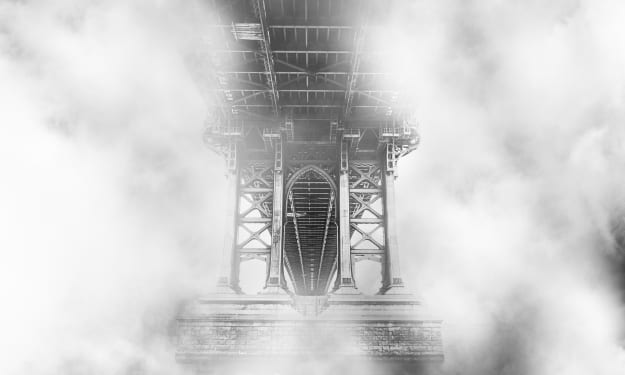Stress Is Real.
You're not apathetic, just tired.

I've been trying to manage my own stress for months. In the beginning, I tried to fight it - mostly, by adding more activities to my already frantic routine. I was teaching three classes online (with students in different time zones), working on projects with two committees at my university, taking two online classes for faculty development, and volunteering as a mentor for a special program. And because I wanted to be healthier, I decided to start cooking all of my own meals using one of the (in)famous meal delivery options that are now available.
I was growing wearier day-by-day, but for me, the challenge of achieving victory over a seemingly ridiculous set of goals was something which, I felt, gave me purpose. However, all the ways in which I was trying to make my life better only made me feel worse. I became slower and less focused. The balance in my life had all but…ceased.
So, what was happening?
Stage 1. Denial
At this stage, I tried to wrestle with my inner demons regarding my stress levels -
I'm not really that tired. I can go on forever with very little sleep and food. The job I do makes me feel so energetic. I'm just happy that I still have a job, and one that I can do from home! My family is safe, in quarantine and self isolating from COVID-19. My friends are well, too. Even though my loved ones are several states (or countries) away, I am doing well. I'm even getting more writing (reading, cooking, grading, etc.) done. Life is good. It's what you do with adversity that makes the difference, after all.
Stage 2. Lethargy
At this point, I knew I was feeling worn out more often than not, but I summed it up to needing to take better care of myself -
I don't understand why I'm tired all of the time. I take all of my vitamins, prescription medication, and herbal supplements. I sleep 8–14 hours a day. I rest whenever I can. I listen to soft, peaceful instrumental music. I stay away from people, events, noise, and all forms of disruption. I take long walks (Not really). But, when I wake up, or get ready to start again, I seem to have a few hours or less of energy to muster, and then, it's back to recharging my batteries, again.
Stage 3. Anxiety
It got fairly frightening for me during this time. I felt like I was on "high alert" and ready for anything -
I think I can meet all of my goals that I have on my "To Do" list today: 1. Take the dog for a walk (I don't have a dog.), 2. Wash two loads of laundry, 3. Cook enough meals for the week, 4. Knit a winter sweater (I can't really knit.), and 5. Clean my bathroom - floor, sink, and all…it's just a few things that I have to accomplish…
Stage 4. Depression
During this juncture, I knew what I was feeling was cyclic: I'd been here before. However, I also thought of ways that I could improve how I was feeling -
I feel so sad. I've talked with friends, family, and my roommate, but it didn't help. I thought having companionship and conversation would ease my feelings of pain and inertia. I didn't want to be isolated, but I didn't want to be around people, either. I thought about going outside. There were hardly any clouds in the sky, the sun was shining, and temperature was a pleasant seventy-five degrees Fahrenheit. I even opened my bedroom curtain, just a little, but then closed it. I turned on my ceiling light so I could more easily read the tiny words glaring back at me on my computer. I have so much work to do today, but I may give up and go to bed.
If you have found yourself hovering under the banter of any of those personal scenarios that I've shared above, you are not alone. Currently, there's a lot in our world to be stressed about, and I found that mental and psychological stressors - worrying about what needs to get done, while overcompensating for not being able to solve all of the world's problems in one day- tend to have sometimes painful, physical consequences.
I often overcompensate by trying to be the "best" person possible, but this alone, cannot make up for constant stress. Eating quality, organic food; sleeping a minimum of eight hours every night; reading uplifting and inspirational stories; and taking long walks through my neighborhood (I didn't really do this) did not help me to relocate my inner peace.
So, what gives?
Responding is interacting with our environments in a personal way. It involves our immediate reaction to someone or something with whom, or which, we've come into contact. Knowing whether a particular interaction is a stressor involves a brief analysis of how we've responded to it.
I know that the stress I'm currently feeling is due to how I've been responding to my environment. Right now, I'm indoors for longer periods of time, and for me, every room is starting to look emblematic of a home office, representing some sort of chore I need to complete. My current set up is a result of unmitigated circumstances, which like, for many of us, required my loyalty, devotion, desire for a paycheck, and a pre-emboldened yearning to remain flexible and adaptive: I'll do what I have to and then I'll do what I want.
And even with everything that needs to be accomplished, it has come down to, not only what has influenced my routine, but also how it has impacted me. Lately, I have started to identify each stressor in my life based on my response and the quality of the interaction:
- What was the experience like? Did I like or hate it? Did it jog a pleasant or unpleasant memory?
- Did it increase my knowledge? Did I gain sudden insight or greater understanding? Or was it wearisome, making me feel "dumber", or causing me to lose focus?
- How did I feel emotionally? Was it something I'd never felt before? Did it help me to feel more relaxed or cause me to become more anxious?
- Did it cause concern? Did I need to take some action, personally or professionally, as a result of the encounter?
If I'm able to get an awareness of how I'm responding to my surroundings, then I can champion some ways of dealing with the stress. My experiences have shown me that the smallest changes can make a big difference.
Here are some suggestions:
Get some fresh air.
We need oxygen. Go outside for 5 minutes or open a window. Or, drink some water while that window is open.
Get a mental health check up.
There are doctors, online, who only do virtual house calls. Some of these physicians even offer free first-time consultations for new patients regardless of whether they have health insurance.
Rest.
There's a difference between taking a nap and taking a break. Forcing ourselves to get some sleep, so we can get up 7 hours later and do it all over again, is not helpful. But, sitting in your favorite chair or just putting your feet up without interfacing with anyone or anything, for just 10 minutes a day, is GOLDEN. (And you'll fall asleep, naturally, if you need to.) There's something to be said for mindlessness!
Get a physical.
If you are having some symptoms which are really troubling, or causing some physical pain, you may want to see a doctor. Again, you can start with a virtual visit. And if you feel safe going out during the COVID-19 pandemic, get a referral for an in-person appointment.
Close your eyes.
Yep! Stop focusing - on anything! Also, breathing deeply while not looking at anything in your surroundings might be the closest you come to actual meditation all day.
Putting some space between myself and stressful situations by using those five subtle methods of meditation and reflection has allowed me to channel my energy in a more focused way. I am able to handle my stress better because I am able to identify, and react to it, accordingly. The truth is that each person's level of stress is different, so how we recognize and manage our triggers or stressors will also differ. For me, it's the difference between being reactionary versus consciously constructing a reality that doesn't keep me on edge.
It should be noted that I am not a doctor nor a licensed therapist or health-care professional. But, I am someone who has lived in several different places, traveling most of her life, under some difficult circumstances. Even so, I have had amazing victories, in large part, based on being able to determine the role that stress has played in my life. I am also a quintessential believer in the power of knowledge, especially via our shared lived experiences, and how it stands to help us solve serious problems.
About the Creator
Kimberly Thomas
Traveler, lecturer, and Belgian waffle lover, who’s constantly juggling life’s adventures.
https://www.linkedin.com/in/drkimberlythomas/






Comments
There are no comments for this story
Be the first to respond and start the conversation.